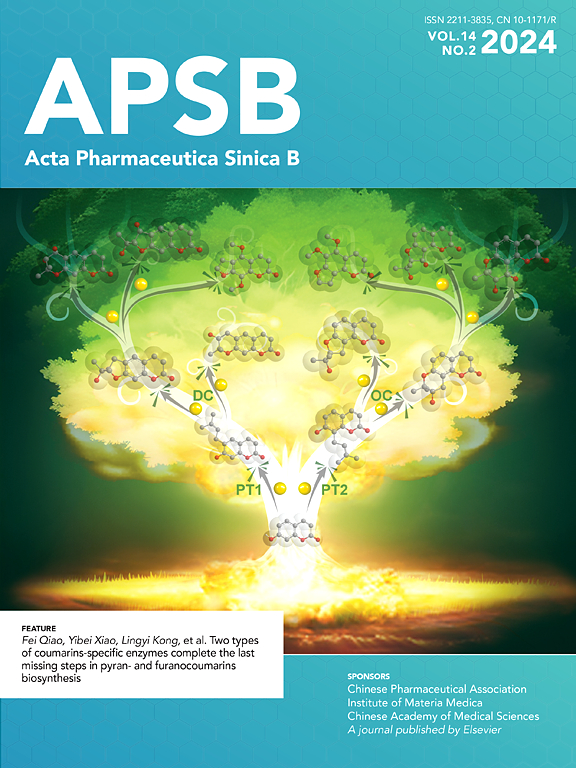CDK5-triggered G6PD phosphorylation at threonine 91 facilitating redox homeostasis reveals a vulnerability in breast cancer
IF 14.7
1区 医学
Q1 PHARMACOLOGY & PHARMACY
引用次数: 0
Abstract
Glucose-6-phosphate dehydrogenase (G6PD), the first rate-limiting enzyme of the pentose phosphate pathway (PPP), is aberrantly activated in multiple types of human cancers, governing the progression of tumor cells as well as the efficacy of anticancer therapy. Here, we discovered that cyclin-dependent kinase 5 (CDK5) rewired glucose metabolism from glycolysis to PPP in breast cancer (BC) cells by activating G6PD to keep intracellular redox homeostasis under oxidative stress. Mechanistically, CDK5-phosphorylated G6PD at Thr-91 facilitated the assembly of inactive monomers of G6PD into active dimers. More importantly, CDK5-induced pho-G6PD was explicitly observed specifically in tumor tissues in human BC specimens. Pharmacological inhibition of CDK5 remarkably abrogated G6PD phosphorylation, attenuated tumor growth and metastasis, and synergistically sensitized BC cells to poly-ADP-ribose polymerase (PARP) inhibitor Olaparib, in xenograft mouse models. Collectively, our results establish the crucial role of CDK5-mediated phosphorylation of G6PD in BC growth and metastasis and provide a therapeutic regimen for BC treatment.

cdk5触发的G6PD苏氨酸91磷酸化促进氧化还原稳态揭示了乳腺癌的脆弱性
葡萄糖-6-磷酸脱氢酶(G6PD)是磷酸戊糖途径(PPP)的第一个限速酶,在多种类型的人类癌症中被异常激活,影响着肿瘤细胞的进展以及抗癌疗法的疗效。在这里,我们发现细胞周期蛋白依赖性激酶5(CDK5)通过激活G6PD来维持氧化应激下的细胞内氧化还原平衡,从而将乳腺癌(BC)细胞中的葡萄糖代谢从糖酵解重新连接到磷酸途径。从机理上讲,CDK5 在 Thr-91 处磷酸化 G6PD 可促进无活性的 G6PD 单体组装成活性二聚体。更重要的是,CDK5 诱导的 pho-G6PD 在人类 BC 标本的肿瘤组织中被明确观察到。在异种移植小鼠模型中,对 CDK5 的药理抑制可显著抑制 G6PD 磷酸化,减弱肿瘤生长和转移,并使 BC 细胞对多聚 ADP 核糖聚合酶(PARP)抑制剂 Olaparib 产生协同增敏作用。总之,我们的研究结果证实了 CDK5 介导的 G6PD 磷酸化在 BC 生长和转移中的关键作用,并为 BC 治疗提供了一种治疗方案。
本文章由计算机程序翻译,如有差异,请以英文原文为准。
求助全文
约1分钟内获得全文
求助全文
来源期刊

Acta Pharmaceutica Sinica. B
Pharmacology, Toxicology and Pharmaceutics-General Pharmacology, Toxicology and Pharmaceutics
CiteScore
22.40
自引率
5.50%
发文量
1051
审稿时长
19 weeks
期刊介绍:
The Journal of the Institute of Materia Medica, Chinese Academy of Medical Sciences, and the Chinese Pharmaceutical Association oversees the peer review process for Acta Pharmaceutica Sinica. B (APSB).
Published monthly in English, APSB is dedicated to disseminating significant original research articles, rapid communications, and high-quality reviews that highlight recent advances across various pharmaceutical sciences domains. These encompass pharmacology, pharmaceutics, medicinal chemistry, natural products, pharmacognosy, pharmaceutical analysis, and pharmacokinetics.
A part of the Acta Pharmaceutica Sinica series, established in 1953 and indexed in prominent databases like Chemical Abstracts, Index Medicus, SciFinder Scholar, Biological Abstracts, International Pharmaceutical Abstracts, Cambridge Scientific Abstracts, and Current Bibliography on Science and Technology, APSB is sponsored by the Institute of Materia Medica, Chinese Academy of Medical Sciences, and the Chinese Pharmaceutical Association. Its production and hosting are facilitated by Elsevier B.V. This collaborative effort ensures APSB's commitment to delivering valuable contributions to the pharmaceutical sciences community.
 求助内容:
求助内容: 应助结果提醒方式:
应助结果提醒方式:


